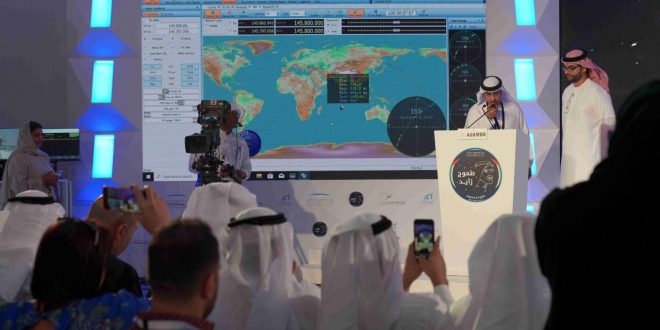The Mohammed bin Rashid Space Centre, MBRSC, organised a press conference for Hazza Al Mansoori, the first Emirati astronaut, with the editors in chief and journalists from various UAE media organisations on Wednesday.
Al Mansoori, who spoke to the media via radio call from aboard the International Space Station,ISS, said that the most important lessons he had learned from his experience included the daily life in the space station, the zero-gravity environment and performing prayers in the space.
“There are so many devices in here and I really benefitted a lot from working with my fellow astronauts who were kind enough to share their knowledge, experience, and the lessons that they have learned along the way,” he said.
Al Mansoori said he was filled with pride when he spoke in Arabic, with Emirati accent.
“At that moment, I remembered the Founding Father, the late Sheikh Zayed bin Sultan Al Nahyan, who dreamed about this moment. I was also proud when I saw the UAE and the Arab world from space for the first time.”
The UAE first astronaut also paid tribute to his teachers, adding that he studied at a public school in Liwa.
Al Mansoori conducted 16 scientific experiments in cooperation with international space agencies, including the European Space Agency, the Japan Aerospace Exploration Agency, and the Russian Space Agency Roscosmos. Six of these experiments will be conducted in microgravity, and the results of the two environments will later be compared.
The experiments include studying the reaction of vital indicators of the human body aboard the ISS, as well as other physical, biological and chemical experiments. Al Mansoori was the first astronaut from the Arab region to participate in such research.
Al Mansoori then began the experiments involving schools in the UAE as part of MBRSC’s Science in Space initiative. In the first phase of the initiative, nearly 16 schools from the UAE participated in the experiments with Al Mansoori present at the workshops.
The UAE Astronaut Programme is the first integrated programme in the Arab region to prepare national cadres to participate in human space flights and carry out various scientific missions, in addition to becoming a part of the research carried out by the global scientific community to devise solutions to many challenges facing humanity.
The UAE Astronaut Programme is funded by the ICT fund of the Telecommunication Regulatory Authority. Launched in 2007, the fund, which is the first of its kind in the Arab world, aims to support research and development within the ICT sector in the UAE, to help it grow into a nationally significant and world-leading industry.
 UAE BARQ برق الإمارات – نبضك
UAE BARQ برق الإمارات – نبضك


